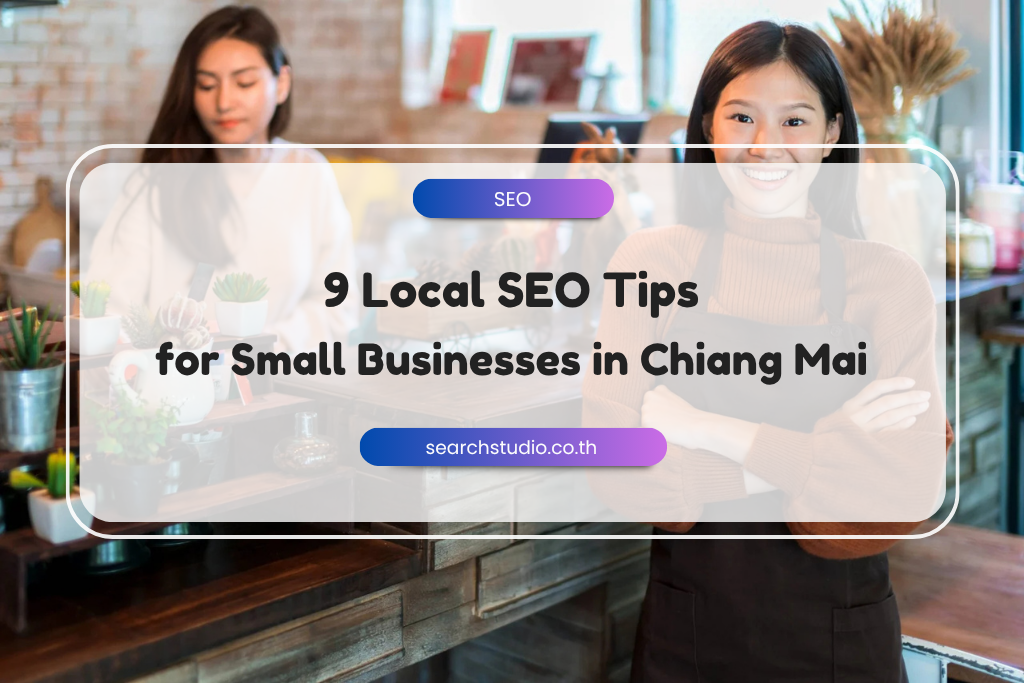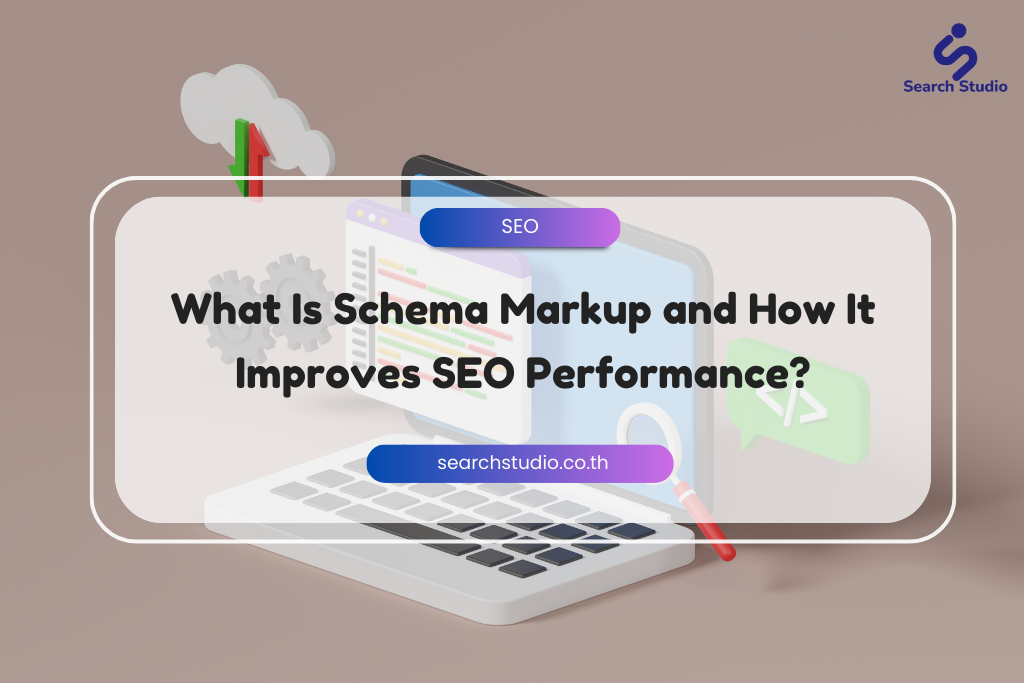For years, marketers relied on long hours of manual research, brainstorming sessions, and a trial-and-error method to find what resonated with audiences. Now, AI-powered tools are cutting that time by providing immediate insights, generating high-quality drafts, and identifying audience trends at scale. AI offers speed, precision, and data-driven direction, while humans bring emotional depth, brand voice, and strategic vision.
We’ll look at how you can apply AI in content marketing to work more efficiently while still keeping your content genuine and true to your brand.
What AI Can Do for Content Marketing
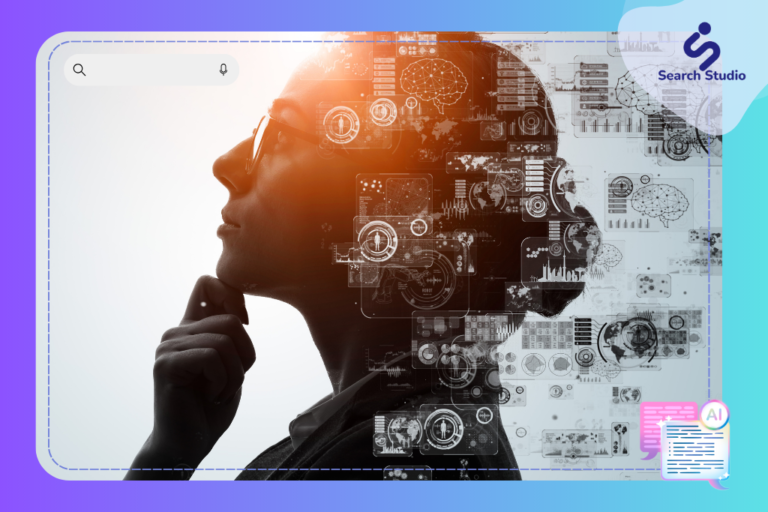
AI becomes a practical, everyday tool that supports every stage of the content marketing process. Instead of guessing what might work, you can now use AI to make decisions backed by data and predictive analysis. Here’s how it plays a role in each step:
Content ideation
AI tools can scan search engine trends, monitor social media conversations, and analyze competitor strategies in real time. This means you can identify trending topics before they peak, discover gaps in your competitors’ coverage, and brainstorm fresh, relevant ideas for blogs, newsletters, social media posts, and even webinars.
Content creation
Tools like ChatGPT, Jasper, and Copy.ai can produce first drafts of blog posts, email campaigns, ad copy, and even video scripts in minutes. They can adjust tone, style, and complexity depending on your audience. AI can also help with microcontent creation, snippets for social media, product descriptions, or FAQs, which are time-consuming to produce manually.
Content optimization
AI-powered SEO tools go beyond basic keyword suggestions. They can cluster related keywords, analyze top-ranking content to understand why it performs well, and recommend internal linking opportunities to strengthen your site structure. AI can also assess your content’s readability, ensure it’s on-brand, and even rewrite sections to meet SEO best practices without losing meaning.
Content Personalization
Modern marketing thrives on relevance, and AI makes personalization scalable. By analyzing customer behavior, purchase history, and engagement patterns, AI can segment your audience into meaningful groups. It then helps you customize messaging so each group feels like your content speaks directly to them from a personalized email subject line, a recommended blog article, or a targeted ad. Insights from site search queries can also reveal what users are actively looking for, allowing you to deliver content that matches their immediate needs.
Content Distribution
AI tools can determine the optimal posting schedule for every platform, factoring in when your audience is most active and engaged. They can automatically adjust post formatting for each channel, making a LinkedIn article, a Twitter thread, and an Instagram carousel from the same base content.
Choosing the Right AI Tools for Content Marketing
Selecting the right tools is one of the most important steps in achieving AI for content marketing success. With so many platforms available, the best choice for your business depends on your marketing goals, your team’s skill set, and your available budget.
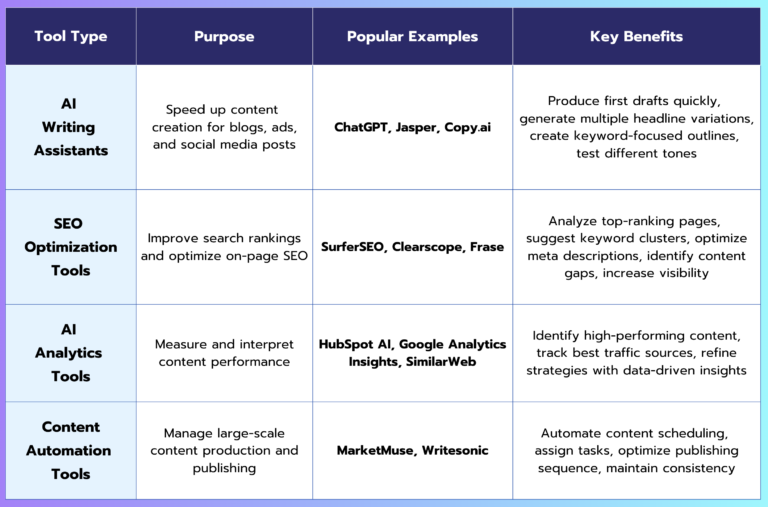
When choosing the best AI tools for content marketing, look for solutions that:
- Integrate seamlessly with your existing systems (CMS, CRM, project management tools)
- Offer collaboration features for team input and editing
- Provide customization options to maintain your brand voice
- Scale with your needs as your content output grows
By choosing tools that fit your unique business requirements, you set the foundation for a scalable, efficient, and high-performing AI-powered content strategy.
Using AI for Each Stage of the Content Marketing Workflow
AI’s now a core driver of AI for content marketing success. By applying the right AI tools for content marketing strategically, you can improve efficiency, sharpen targeting, and produce higher-quality content faster than ever before. Here’s how to use AI in content marketing in a tactical, results-focused way.
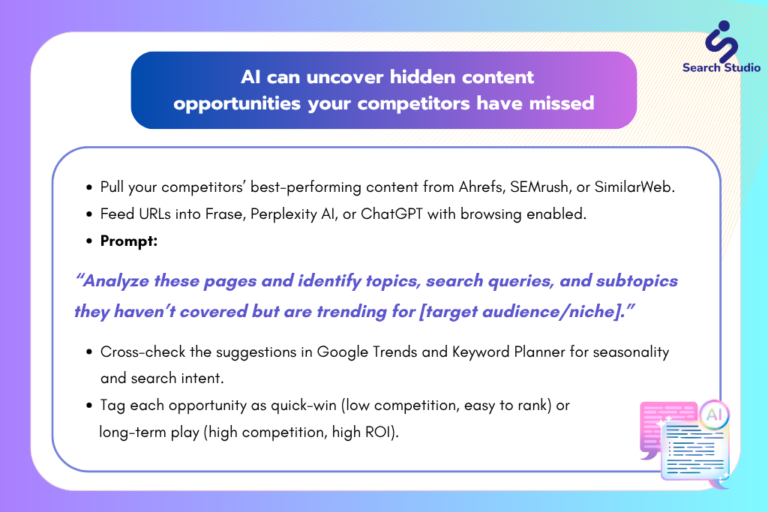
1. AI can uncover hidden content opportunities your competitors have missed
Too many marketers still rely on generic keyword lists. A more advanced method uses AI in content marketing to merge content gap analysis with trend prediction, so you find profitable topics before they’re saturated.
Workflow:
- Pull your competitors’ best-performing content from Ahrefs, SEMrush, or SimilarWeb.
- Feed URLs into Frase, Perplexity AI, or ChatGPT with browsing enabled.
- Prompt:
“Analyze these pages and identify topics, search queries, and subtopics they haven’t covered but are trending for [target audience/niche].”
- Cross-check the suggestions in Google Trends and Keyword Planner for seasonality and search intent.
- Tag each opportunity as quick-win (low competition, easy to rank) or long-term play (high competition, high ROI).
Pro Tip: This is how to leverage AI in marketing to create targeted, unique content that’s easier to rank and own in search results.
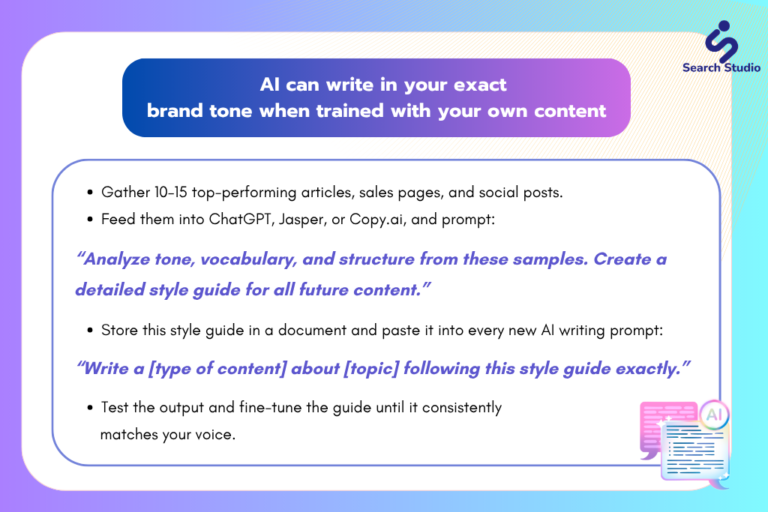
2. AI can write in your exact brand tone when trained with your own content
One of the biggest concerns about AI in SEO and content marketing is that it produces generic, lifeless text. You can overcome this by training AI with your best content so it replicates your voice and personality.
Workflow:
- Gather 10–15 top-performing articles, sales pages, and social posts.
- Feed them into ChatGPT, Jasper, or Copy.ai.
- Prompt:
“Analyze tone, vocabulary, and structure from these samples. Create a detailed style guide for all future content.”
Store this style guide in a document and paste it into every new AI writing prompt:
“Write a [type of content] about [topic] following this style guide exactly.”
Test the output and fine-tune the guide until it consistently matches your voice.
Pro Tip: This ensures how to use AI for content creation still results in unique, brand-aligned work your audience will trust.
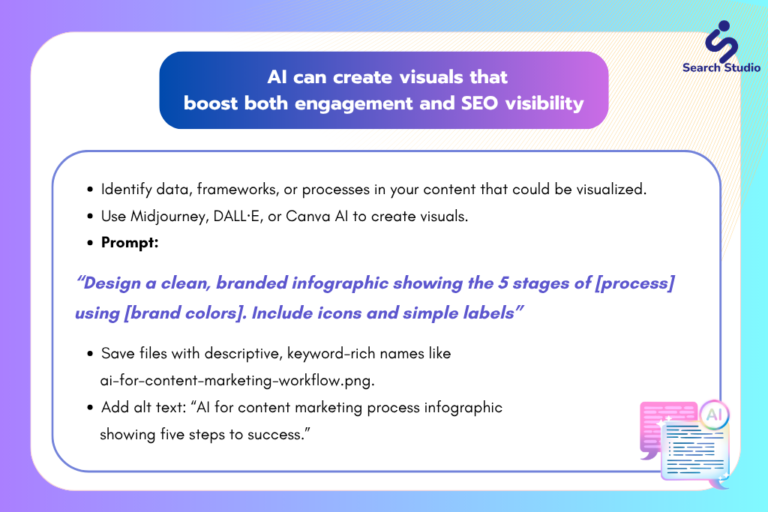
3. AI can create visuals that boost both engagement and SEO visibility
Text alone isn’t enough. AI in content marketing can generate original, branded visuals that support SEO by ranking in Google Images and increasing shareability on social media.
Workflow:
- Identify data, frameworks, or processes in your content that could be visualized.
- Use Midjourney, DALL·E, or Canva AI to create visuals.
- Prompt:
“Design a clean, branded infographic showing the 5 stages of [process] using [brand colors]. Include icons and simple labels.”
- Save files with descriptive, keyword-rich names like ai-for-content-marketing-workflow.png.
- Add alt text: “AI for content marketing process infographic showing five steps to success.”
Pro Tip: Repurpose these graphics into Pinterest pins, LinkedIn carousels, and Instagram posts to capture more organic reach.
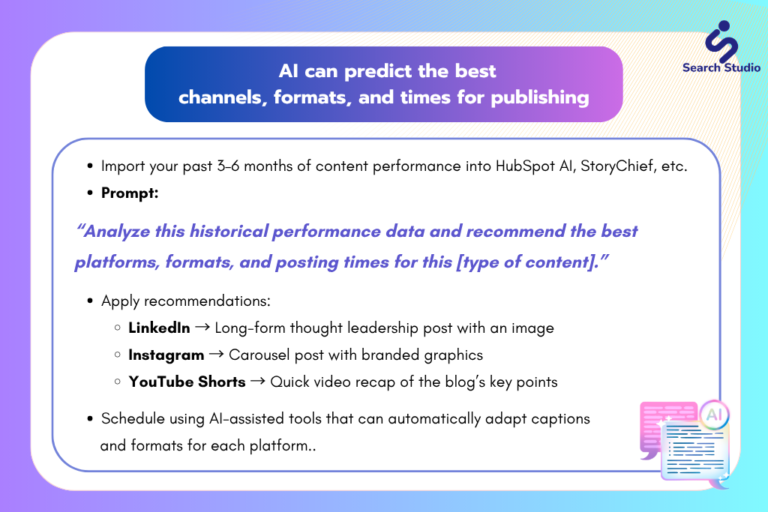
4. AI can predict the best channels, formats, and times for publishing
Instead of guessing, you can use AI prompts for content marketing to find exactly where and when to publish for the highest engagement.
Workflow:
- Import your past 3–6 months of content performance into HubSpot AI, StoryChief, or Buffer AI.
- Prompt:
“Analyze this historical performance data and recommend the best platforms, formats, and posting times for this [type of content].”
Apply recommendations:
- LinkedIn → Long-form thought leadership post with an image
- Instagram → Carousel post with branded graphics
- YouTube Shorts → Quick video recap of the blog’s key points
Schedule using AI-assisted tools that can automatically adapt captions and formats for each platform.
Pro Tip: This is a real-world example of how can generative AI be used in marketing to work smarter, not harder.
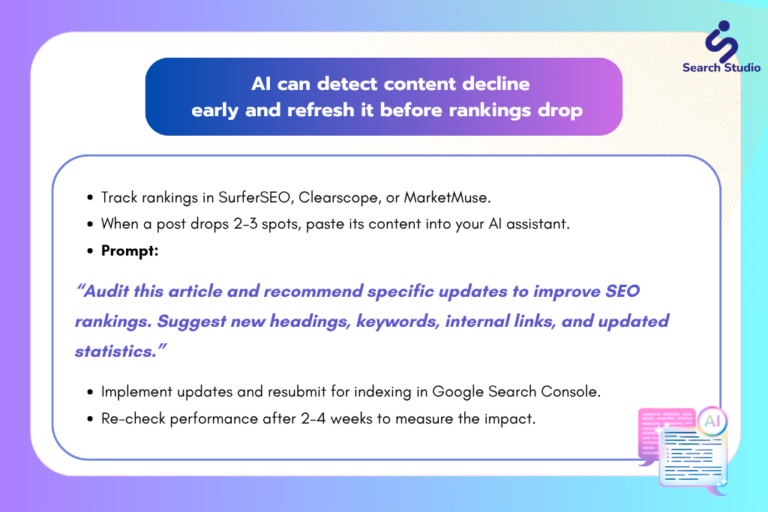
5. AI can detect content decline early and refresh it before rankings drop
One of the most overlooked uses of AI in content marketing is content maintenance. AI can spot early ranking declines and recommend specific updates before your traffic loss becomes serious.
Workflow:
- Track rankings in SurferSEO, Clearscope, or MarketMuse.
- When a post drops 2–3 spots, paste its content into your AI assistant.
- Prompt:
“Audit this article and recommend specific updates to improve SEO rankings. Suggest new headings, keywords, internal links, and updated statistics.”
- Implement updates and resubmit for indexing in Google Search Console.
- Re-check performance after 2–4 weeks to measure the impact.
Pro Tip: This proactive approach to how AI is being used in marketing often generates faster ROI than publishing new content from scratch.
Ethical Considerations in AI Content Marketing
AI has become a powerful ally for modern marketing teams. But the more you rely on AI for content marketing, the more important it becomes to set clear ethical guardrails. The goal is not to avoid AI. It’s to use it responsibly so your content remains accurate, original, and aligned with your brand values.
Below are the key considerations to keep your AI in content marketing strategy effective without compromising trust.
1. Be transparent when credibility is involved
If content is published under an expert’s name, includes sensitive claims, or influences decisions, clarify that it’s AI-assisted and human-reviewed. This reduces confusion about how AI is being used in marketing and reinforces accountability.
2. Verify accuracy and sources
AI can sound confident even when it’s wrong. Fact-check statistics, claims, and references with reliable sources before publishing.
3. Protect originality and brand voice
Even with strong AI tools for content marketing, outputs can feel generic or too similar to common web content. Use AI for structure and drafting, then add your real examples, insights, and tone. That’s how to use AI for content creation without losing uniqueness.
4. Respect privacy and confidential data
Avoid pasting sensitive customer info or internal documents into tools without clear policies. Before adopting new AI tools for content marketing, confirm what data is stored, who can access it, and whether inputs are reused.
5. Avoid manipulation and fake social proof
Don’t generate fake testimonials, reviews, or fabricated case studies. Personalization should feel helpful, not intrusive. Ethical use supports long-term AI for content marketing success.
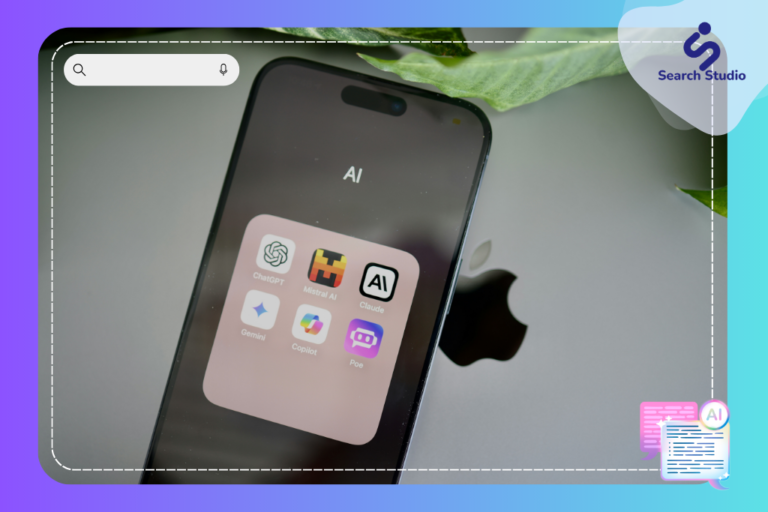
AI’s here to make marketers more effective. The key to AI for content marketing successis to use AI for speed and scale, but keep human creativity and strategy in control. If you’re wondering how to leverage AI in marketing, start with small, manageable projects. Experiment with a few tools, track results, and build your AI capabilities over time. The more you understand how to use AI for content marketing, the more you can unlock its potential for growth.
At Search Studio, we don’t just follow AI trends, we help businesses turn them into real-world results. Our team blends cutting-edge AI tools for content marketing with proven managed SEO strategies to deliver campaigns that perform today and stay competitive tomorrow. Ready to boost your marketing with AI-powered strategies? Explore more insights on our blog or contact us today for an expert consultation designed for your business’s growth.


